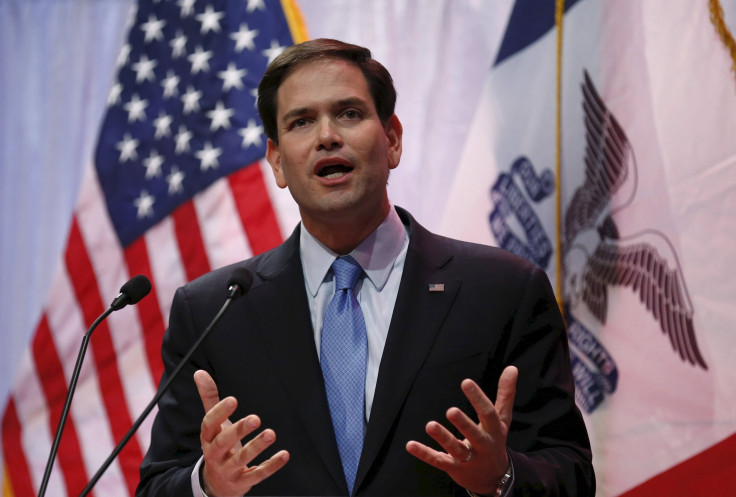Election 2016: Marco Rubio Unveils Foreign Policy Rooted In Military Prowess, American Values

Presidential candidate Sen. Marco Rubio presented his most definitive foreign policy vision yet on Wednesday, outlining a Rubio Doctrine based on a robust U.S. military and vowing to reverse what he characterized as hesitancy and weakness under President Barack Obama and Hillary Clinton’s term as secretary of state.
Speaking at the Council on Foreign Relations Wednesday afternoon, the Florida senator described the three pillars of his foreign policy platform: U.S. military strength, protection of the American economy and promotion of U.S. values -- including the “spread of economic and political freedom” -- around the globe.
In a brief speech and conversation with interviewer Charlie Rose, Rubio pledged to reverse spending cuts for the U.S. military and keep intelligence programs, including domestic surveillance under the 2001 Patriot Act, intact. He emphasized the need for strong U.S. leadership on a wide range of foreign policy issues, including an increased U.S. naval presence to monitor China’s military conflicts in the East and South China Seas, more support for Ukrainian rebels to counter Russian President Vladimir Putin’s aggressions and a hard-line view of the threats posed by Iran's nuclear ambitions.
“This approach will restore American leadership to a world badly in need of it,” he said. “It will reestablish a foreign policy based on strategy and principle rather than politics and polls -- one that is overseen by the White House but not micromanaged by it, and that will restore America’s status as a nation that shapes global events rather than one that is shaped by them.”
Rubio avoided saying whether he thought the Obama administration was demonstrating military leadership with its drone strikes against extremists and airstrike campaign against the Islamic State group, also known as ISIS, in Iraq. Instead, Senator Rubio emphasized his view that the emergence of ISIS and Jabhat al-Nusra in Iraq were the products of the Obama administration’s failure to intervene in Syria earlier to assist rebels against the regime of Bashar al-Assad.
Rubio’s remarks Wednesday showed the turn that the Florida senator has made recently toward more hawkish, neoconservative principles that recalled the era of former President George W. Bush. But he balked at a question on whether the U.S. should serve as the “world’s policeman.”
“I don’t think that’s necessarily the role that I would advocate,” Rubio said. “The title is not ‘world’s policeman,’ but these problems require a global response. But a global response requires someone to convene the world to take action, and only America’s capable of doing that.”
Rubio referred to Bush at one point, after interviewer Charlie Rose asked whether Rubio would have supported the U.S. invasion of Iraq had he known about the intelligence failures regarding the country's alleged possession of weapons of mass destruction.
“Not only would I not have been in favor of it, but President Bush would not have been in favor of it,” Rubio replied.
Earlier this year, by contrast, Rubio said in an interview on Fox News that he didn’t believe the Iraq invasion was a mistake. “The world is a better place because Saddam Hussein is not in Iraq,” he said at the time.
On the U.S.’s rapprochement with Cuba, which Rubio, the son of Cuban immigrants, has vehemently opposed, he stuck firmly to his stance that the United States should maintain sanctions against the island, to be lifted only by reciprocal measures from the Castro regime.
When reminded that 50 years of the embargo had done little to move the Castro regime toward democracy, Rubio replied that the embargo had been intended to prevent the trafficking of property that had been nationalized in the Cuban Revolution.
“There is no Cuban economy,” he said. “The entire economy is owned by a holding company named Gaesa, which is run by Raul Castro’s son-in-law. The hotels, telecom companies, the rental cars -- everything is under the umbrella of that holding company. So we don’t have an opening to the Cuban economy. We have an opening to Gaesa.”
The senator took the opportunity to criticize Hillary Clinton, the Democratic presidential candidate whom he might face in a general election, if he wins the GOP nomination. He dismissed her as a “leader of yesterday whose tenure as secretary state was ineffective at best and dangerously negligent at worst.” Clinton's “reset” with Russia was a “disaster, because it misunderstood Putin’s ambitions and Putin’s motivations,” he said. Meanwhile, he said Clinton was “completely negligent” on Latin American affairs, saying she failed to build stronger relationships with rising economic powers like Mexico, Chile and Colombia while ignoring countries that have “moved in the opposite direction,” including Argentina, Venezuela and Ecuador.
“She was the chief architect and spokesperson of a foreign policy that will go down in history as a disaster,” he said.
© Copyright IBTimes 2024. All rights reserved.






















